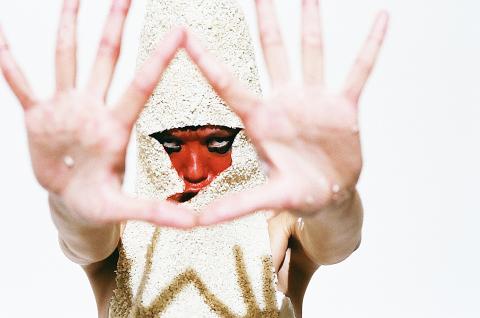On Saturday next week, Urban Nomad Film Festival begins proceedings with a party. The lineup includes Taiwanese American DJ Mochipet on his first visit to Taiwan. Hailing from San Francisco, the glitch-hop and dubstep artist is heavily into bass and dresses like a purple dinosaur.
He’ll be joined by Taiwan’s own Funky Brothers (who perform with between eight to 10 members on stage at any given time), DJ Marcus Aurelius, and the electro-diva grrrls of Go Chic, which has toured extensively and is producing an album in Berlin with the help of Canada’s foremost electro artist Peaches.
Headlining the night is Japanese art-dance-fashionista-freaks Trippple Nippples. Think Lady Gaga triplets crossed with gross-out band Gwar, and you still aren’t even close.

Photo courtesy of Takeru Kihara
The three lead singers of the band make their own costumes, which have included rotten spaghetti and latex dresses, and rice encrusted headgear and body armor, by hand.
“The process we take while we are making the costume, etc, is the most uncolorful, sweatshop-ish part,” said band member Orea Nippple. “It’s like Third World, but we love it so I guess we can’t complain.”
The group’s wild stage antics and messy costumes have had them kicked out of various venues. “You should think about how you could mess us up rather than worrying about how you can get away from getting messed up,” warned Yuka Nippple, who describes the group’s music as “headache and stomachache and strawberry ice cream.”

Growing up in a rural, religious community in western Canada, Kyle McCarthy loved hockey, but once he came out at 19, he quit, convinced being openly gay and an active player was untenable. So the 32-year-old says he is “very surprised” by the runaway success of Heated Rivalry, a Canadian-made series about the romance between two closeted gay players in a sport that has historically made gay men feel unwelcome. Ben Baby, the 43-year-old commissioner of the Toronto Gay Hockey Association (TGHA), calls the success of the show — which has catapulted its young lead actors to stardom -- “shocking,” and says

The People’s Republic of China (PRC) invaded Vietnam in 1979, following a year of increasingly tense relations between the two states. Beijing viewed Vietnam’s close relations with Soviet Russia as a threat. One of the pretexts it used was the alleged mistreatment of the ethnic Chinese in Vietnam. Tension between the ethnic Chinese and governments in Vietnam had been ongoing for decades. The French used to play off the Vietnamese against the Chinese as a divide-and-rule strategy. The Saigon government in 1956 compelled all Vietnam-born Chinese to adopt Vietnamese citizenship. It also banned them from 11 trades they had previously

Inside an ordinary-looking townhouse on a narrow road in central Kaohsiung, Tsai A-li (蔡阿李) raised her three children alone for 15 years. As far as the children knew, their father was away working in the US. They were kept in the dark for as long as possible by their mother, for the truth was perhaps too sad and unjust for their young minds to bear. The family home of White Terror victim Ko Chi-hua (柯旗化) is now open to the public. Admission is free and it is just a short walk from the Kaohsiung train station. Walk two blocks south along Jhongshan

As devices from toys to cars get smarter, gadget makers are grappling with a shortage of memory needed for them to work. Dwindling supplies and soaring costs of Dynamic Random Access Memory (DRAM) that provides space for computers, smartphones and game consoles to run applications or multitask was a hot topic behind the scenes at the annual gadget extravaganza in Las Vegas. Once cheap and plentiful, DRAM — along with memory chips to simply store data — are in short supply because of the demand spikes from AI in everything from data centers to wearable devices. Samsung Electronics last week put out word